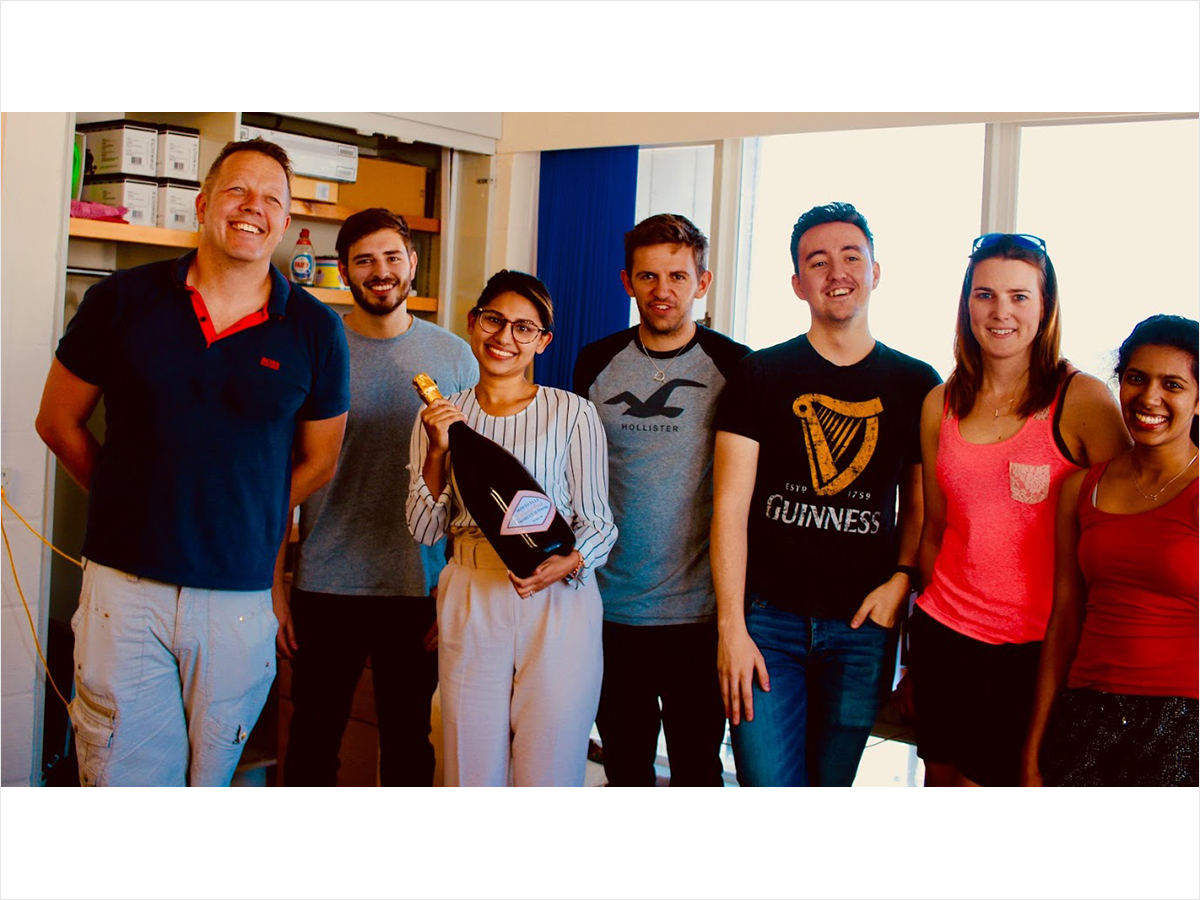Boosting your career with our Research Fund

The Spencer lab, from left to right: John Spencer, Dr Andrew McGown, Dr Raysa Khan, Dr Storm Hassell-Hart, Anthony Edmonds, Ella Lineham and Arathy Jose. Picture: © John Spencer
Professor John Spencer from the University of Sussex and past recipient of our Research Fund talks to us about what it meant to him to receive the grant and how it’s helped to shape his career since.
Having left the pharmaceutical industry when the James Black Foundation was closing down in 2006, I embarked on my first academic position, as a reader in medicinal chemistry at the University of Greenwich. I applied for the Research Fund (at the time it was paper based and one could not add formulae or structures!) and was successful in obtaining this grant for the maximum three years in succession (£6,000 in total).
I had been told that at reader level I was not eligible for a First Grants Scheme application by Research Councils UK, so this money was an excellent boost. It meant I could buy some basic equipment and, more importantly, some chemical intermediates that were relatively expensive.
This gave us a real boost as we could concentrate on the science and we effectively avoided months of painstaking chemistry trying to make known intermediates and feedstocks! We have since also been able to team up with world leading institutions such as the Structural Genomics Consortium, in Oxford and Toronto and the Laboratory of Molecular Biology, Cambridge, leading to further grant income and publications.
As a result of this grant, we published a number of papers on organometallic-based anticancer agents*. Since then, I’ve moved to the University of Sussex where I was promoted to professor two years ago and have had the honour and pleasure of sitting on the Research Fund as both a committee member from 2014 to 2017 and last year as interim chair, succeeding Professor Keith Jones of the Institute of Cancer Research, who has been a wonderful personal mentor, friend and a fantastic ambassador for the RSC. Seeing the number of applications, their quality, and how the recipients progress with excellent papers and further grant outputs is a wonderful experience although it is an extremely competitive process with, unfortunately, a lot of superb grants not quite being funded.
I think this scheme has grown in stature, continues to attract grant applications of the highest quality and it makes a difference, for what may seem to be a relatively small amount of grant income (£4000 maximum). It provides a specific electrode or a pump that are vital for an experiment to lead to a bigger grant or a paper. One of the real attributes of the fund is that it not only makes a difference to early career researchers as I was, but it also often focuses on real world problems in places where resources are quite scarce; the results can have immediate impact.
When asked what his key advice would be to prospective applicants he replied:
Have a good think about what you need, not how much money you can get. In general, an application will look better if it's to serve a particular purpose, for example to buy a piece of vital specialised equipment, even if this is only £2000.
The funding I received gave me a boost in my confidence, it gave me several papers, conference invitations, external PhD examination invitations and I hope that it will help many other members fulfil their ambitions and succeed.
*see for example:
1. Click JAHAs: Conformationally Restricted Ferrocene-based Histone Deacetylase Inhibitors. Spencer, J.*, Amin, J., Boddiboyena, R., Packham, G., Cavell, B. E., Syed Alwi, S. S., Paranal, R. M., Heightman, T. D., Wang, M., Marsden, B., Coxhead, P., Guille, M., Tizzard, G. J., Coles, S. J., and Bradner, J.E. Med. Chem. Commun. 2012, 3, 61-64.
2. Synthesis and Biological Evaluation of JAHAs: Ferrocene-based Class I Histone Deacetylase Inhibitors; Spencer, J.*, Amin, J., Heightman, T., Packham, G., Paranal, R., Bradner, J.E., Tizzard, G., Coles S.J. ACS MedChem. Lett. 2011, 2, 358-362.
3. Structural and Biological Investigation of Ferrocene-Substituted 3-Methylidene-1,3-dihydro-2H-indol-2-ones, Spencer, J.*, Mendham, A. P., Kotha, A. K., Richardson, S. C. W., Hillard, E., Jaouen, G., Vessières, A., Male, M., Hursthouse, M. B. Dalton Trans. 2009, 918-921
More information
Our Research Fund is currently open for applications. You can apply for up to £4,000 to support your independent research. Find out more and apply by 24 September.
Find out more about John's research group at the University of Sussex.